55% of Americans expect routine space tourism over next 50 years
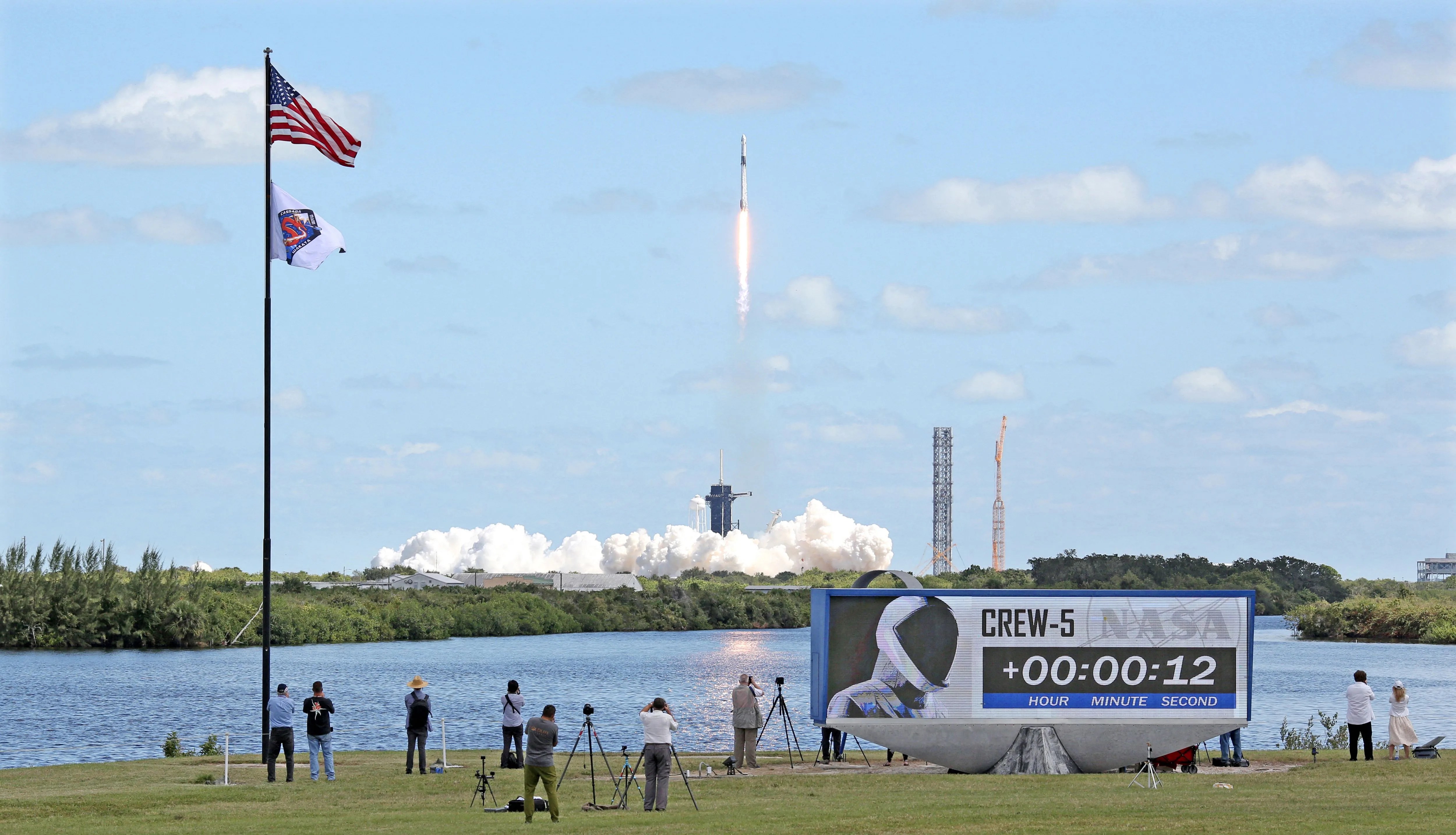
Pew Research Center conducted this study to understand Americans’ views of space issues. For this analysis, we surveyed 10,329 U.S. adults from May 30 to June 4, 2023.
Everyone who took part in the survey is a member of the Center’s American Trends Panel (ATP), an online survey panel that is recruited through national, random sampling of residential addresses. This way, nearly all U.S. adults have a chance of selection. The survey is weighted to be representative of the U.S. adult population by gender, race, ethnicity, partisan affiliation, education and other categories. Read more about the ATP’s methodology.
Here are the questions used for this report, along with responses, and its methodology.
In a changing world of space exploration defined by intensifying private efforts and competition between a growing number of nations, Americans continue to see an essential role for the United States as a leader in space exploration, according to a new Pew Research Center survey.
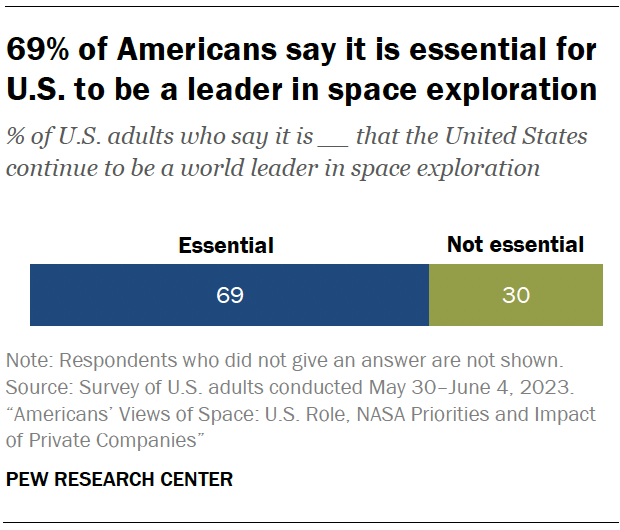
About seven-in-ten Americans say it is essential that the U.S. continue to be a world leader in space, while 30% say this is not an essential role for the country. Support for a U.S. leadership role in space is widely held across groups, including by majorities of Republicans and Democrats alike.
More than 50 years ago, space exploration was a race to the moon between the U.S. and the former Soviet Union. In 1998, the International Space Station launch marked a highlight for international cooperation in space between the U.S., Russia, Japan, Canada and Europe.
Today, more countries, such as India and China, are pursuing their own goals in space, which could challenge the U.S. as a world leader. China, a country many Americans view as a competitor, has goals of sending human astronauts to the moon and expanding its own space station.
Most Americans continue to believe that the U.S. space agency NASA has a critical role to play, even as private space companies like SpaceX, Blue Origin and Virgin Galactic are increasingly involved in space. Overall, 65% of U.S. adults say it is essential that NASA continue to be involved in space exploration, the survey finds. A smaller share (32%) believe that private companies will ensure enough progress is made in space exploration, even without NASA’s involvement.
The new survey takes a wide-ranging look at Americans’ attitudes toward space, including the contributions of private companies, priorities for NASA and public expectations for the next 50 years in space. Other important findings from the survey of 10,329 U.S. adults conducted May 30 to June 4, 2023, include:
- NASA objectives: Monitoring asteroids that could potentially hit the Earth ranks at the top of the public’s priority list for NASA. Monitoring the planet’s climate system also ranks highly as a priority for NASA. But relatively few Americans say it should be a top priority to send human astronauts to the moon or Mars.
- Space tourism: 55% of U.S. adults expect that people will routinely travel in space as tourists in the next 50 years. However, Americans, on balance, are not enthusiastic about traveling to space themselves: 35% say they would be interested in orbiting Earth in a spacecraft, compared with 65% who say they would not be interested in this.
- Evaluations of private space companies: Americans are more likely to say private space companies are doing a mostly good job than a bad job at building safe and reliable spacecraft, making important contributions to space exploration, and opening up space travel to more people. Still, many are unsure how private companies are doing in these areas, reflecting limited familiarity with them. And the public strikes a less positive tone when it comes to how private space companies are doing limiting debris in space from rockets and satellites: 26% say they are doing a mostly bad job, compared with 21% who say they are doing a mostly good job (53% say they’re not sure).
- Americans’ engagement with space: 47% of Americans say they’ve done at least one of four space-related activities in the last year, including 26% who say they’ve looked at an image from a space telescope, such as the James Webb Space Telescope.
Future expectations for developments in space
As Americans look to the future of space, a large share expect problems with human-made debris. More than half expect space tourism to become routine. But the public is less confident that other events will happen – including discovering intelligent life and building colonies on other planets.
About seven-in-ten Americans (69%) think there will definitely or probably be a major problem with debris in space from rockets, satellites and other human-made objects over the next 50 years. Fewer (30%) think this definitely or probably will not happen.
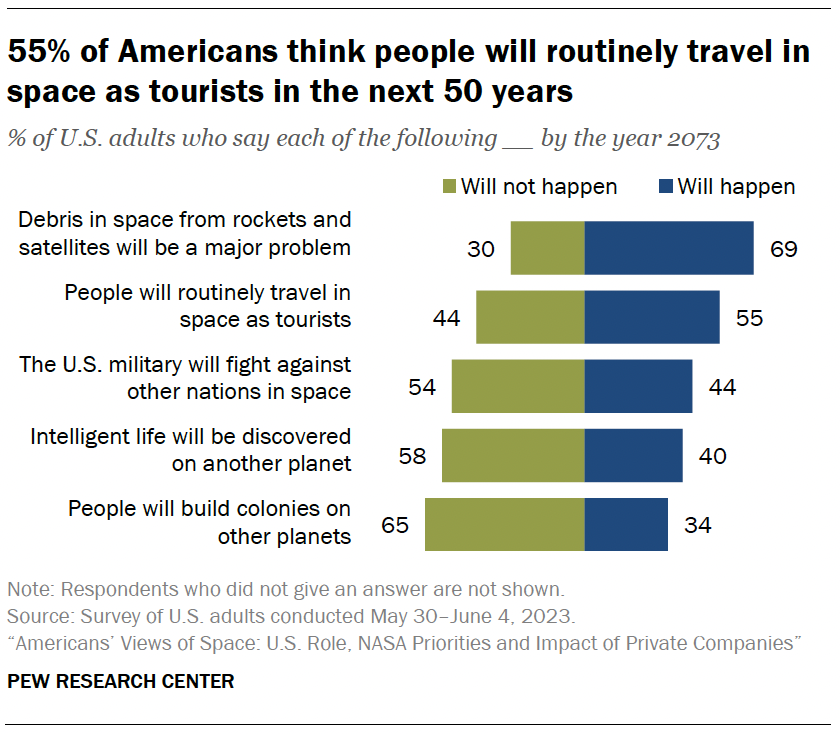
When it comes to space tourism, a majority of Americans (55%) expect people will routinely travel to space as tourists by the year 2073, while 44% think this will not happen. The share of Americans who think space tourism will become routine over the next 50 years is up 5 percentage points since 2018, the last time the Center asked this question.
Americans see other futuristic possibilities in space as less likely in the next 50 years. Still, 44% think the U.S. will definitely or probably fight against other nations in space in the next 50 years. In 2019, the U.S. established Space Force as a separate branch of the military.
Four-in-ten Americans believe intelligent life will definitely or probably be discovered on another planet over the next 50 years; 58% don’t expect this to happen. In a 2021 Pew Research Center survey, 65% of Americans said their best guess was that intelligent life does exist on other planets.
Only about one-third of Americans say colonies that can be lived in for long periods of time will be built on other planets in the next 50 years, while 65% say this will not happen. The share of Americans who think space colonies will be built in the next 50 years is virtually unchanged since 2018.
Public views of NASA’s top priorities in space

NASA is engaged in a wide range of activities in space, including exploration and applied and basic research. When asked what NASA’s priorities should be, Americans rank monitoring asteroids that could hit the Earth and monitoring the Earth’s climate system at the top of the list. There’s far less public urgency for NASA to send humans to the moon or Mars and to search for other planets that could support life.
Six-in-ten Americans say it’s a top priority for NASA to monitor asteroids and other objects that could potentially hit the earth. Another 30% say this is an important, but lower, priority for NASA, and just 9% say this is not too important or should not be done.
Monitoring key parts of the Earth’s climate system ranks second on the public’s list: 50% say this should be a top priority for NASA.
Fewer than half of Americans rate the other seven objectives the Center asked about as top priorities for NASA.
Large majority of Americans see NASA favorably
About three-quarters of Americans said they have a favorable opinion of NASA in a March 2022 Pew Research Center survey. Only 9% said they had an unfavorable view. Of the 16 federal agencies included in the survey, NASA had the third-highest favorable rating.
Large shares of Democrats (79%) and Republicans (71%), including those who lean to each party, expressed a favorable opinion of NASA.
Four-in-ten say conducting basic scientific research to increase knowledge of space should be a top priority. And 35% say developing technologies that could be adapted for other uses should be a top priority. About three-in-ten each say conducting scientific research on how space travel affects human health and searching for raw materials that could be used on Earth are top priorities for NASA. Most Americans, however, say each of these four objectives are either a top or important, but lower, priority for NASA.
Few Americans say searching for life and planets that could support life (16%) should be a top priority for NASA; a larger share (39%) say this is not too important or that NASA should not do this.
Just 12% of Americans say sending human astronauts to explore the moon should be a top priority for NASA, and only 11% say this about sending human astronauts to explore Mars. Larger shares think both of these things are not too important for NASA or that they should not be done (41% and 43%, respectively).
In April, NASA announced the crew for the Artemis II mission, scheduled for late 2024, which would fly around the moon, taking astronauts the furthest from Earth since the 1970s. The next planned mission would be for a lunar landing. Missions to the moon are considered important preparation for sending astronauts to Mars.
Compared with 2018, Americans see many of these priorities as less pressing than they did five years ago, with declines in the shares who call each a top priority. Still, large shares continue to view most of them as important, but lower, priorities for NASA. (Refer to the topline for more details.)
Those most familiar with NASA are more likely to place the highest priority on a range of objectives for the agency
About one-in-ten Americans say they have heard or read a lot about NASA in the last year. Another 56% say they have heard a little, and 33% say they have heard nothing at all. These shares are virtually unchanged since 2018.
Those most familiar with NASA are more likely than those who have heard less about the agency to say each of the nine objectives included in the survey should be a top priority for NASA. For instance:
- Those who have heard a lot about NASA are about twice as likely as those who have heard nothing at all to say conducting basic scientific research should be a top priority (59% vs. 28%).
- 44% of those who are most familiar with NASA say conducting scientific research on how space travel affects human health should be a top priority, compared with 24% of those least familiar with the space agency.
For more information, refer to the Appendix.
Men are especially likely to support a U.S. leadership role in space, be familiar with NASA
Majorities of men and women say it is essential that the U.S. continue to be a world leader in space exploration, though men are 12 percentage points more likely than women to take this view (75% vs. 63%).
Men are also somewhat more likely than women to say they are familiar with NASA, saying they have heard at least a little about the U.S. space agency in the past year (75% of men vs. 60% of women).
Nonetheless, men and women have largely similar views on most of NASA’s priorities included in the survey. For instance, nearly equal shares of men (61%) and women (60%) say it should be a top priority for NASA to monitor asteroids and other objects that could potentially hit the Earth.
One area in which there is a sizable difference between men and women is their rating of NASA conducting basic scientific research: 47% of men say conducting basic scientific research to increase knowledge of space should be a top priority, compared with 35% of women.
For more, refer to the Appendix.
Republicans and Democrats have much in common in their views on the U.S. role in space and NASA’s priorities, but differ on monitoring Earth’s climate
Republicans and Democrats – including those who lean to each party – are nearly equally likely to say the U.S. should be a world leader in space exploration (72% and 69%, respectively). Partisans also have largely similar views on many of NASA’s priorities.
For example, majorities of Democrats (64%) and Republicans (57%) say monitoring asteroids that could hit the Earth should be a top priority for NASA. At the other end of the spectrum, relatively few Democrats and Republicans place top priority on sending human astronauts to the moon (12% and 13%) or Mars (12% and 10%).
However, partisans differ over how much priority NASA should put on monitoring the Earth’s climate system. About seven-in-ten Democrats say monitoring key parts of the climate should be a top priority for NASA. By contrast, just 30% of Republicans place the highest priority on this (25% say it’s not too important or should not be done at all). Previous Center research has shown that Republicans are much less likely than Democrats to view climate change as a major problem and to say it poses a major threat to the country.
Democrats are also more likely than Republicans to prioritize conducting basic research to understand space, though the difference in views is more modest: 47% of Democrats say conducting basic research to increase knowledge and understanding of space should be a top priority for NASA, compared with 35% of Republicans. Past Center surveys have found Democrats are more likely than Republicans to say government investments in basic scientific research usually pay off in the long run.
For more on views on NASA’s priorities by gender, political party and education, refer to the Appendix.
Americans see NASA playing essential role as private companies become more involved
The private sector has become increasingly involved in space exploration. Companies like Virgin Galactic, SpaceX and Blue Origin are taking people to space in their own private spacecrafts. And NASA is increasingly partnering with private companies to accomplish its missions.
Still, Americans by and large view NASA as critical to space exploration: 65% say it is essential that NASA continue to be involved in space exploration, while far fewer (32%) say private companies will ensure enough progress is made in space exploration, even without NASA’s involvement. While the private space landscape has evolved significantly over the last five years, public views on NASA’s role are nearly identical to those measured in 2018, the last time the Center asked the question.
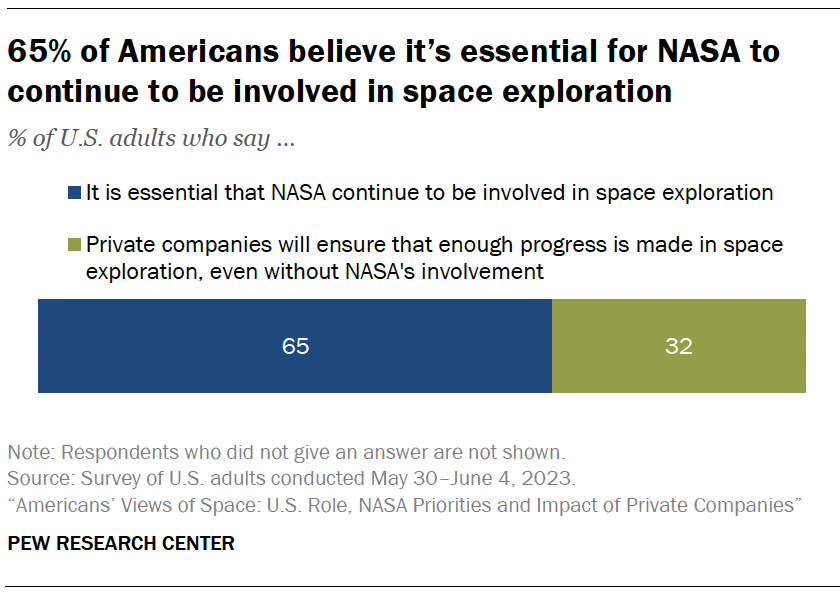
The belief that NASA should continue to be involved in space exploration is widely held across demographic groups. For instance, similar majorities of the youngest and oldest adults say it is essential that NASA continue to be involved in space exploration (65% of adults ages 18 to 29 vs. 67% of adults 65 and older).
On balance, more than half of both Republicans and Democrats think it is essential that NASA continue to be involved in space exploration, though Democrats are 20 percentage points more likely than Republicans to hold this view (76% vs. 56%).
Americans give private space companies more positive than negative ratings on building safe and reliable spacecraft, contributing to space exploration and opening up space travel
When asked to assess four core areas of private space companies’ performance, Americans offer more positive than negative assessments of how private companies are doing at building safe and reliable spacecraft, contributing to space exploration, and opening up space travel to more people.
Ratings are more mixed when it comes to the job private companies are doing limiting debris from objects like rockets and satellites. And across all four areas of performance, many Americans say they are unsure, reflecting the limits of the public’s familiarity with the operations of private space companies.
In three of the four areas, Americans are far more positive than negative:
- More Americans think private space companies are doing a mostly good job than a mostly bad job building rockets and spacecraft that are safe and reliable (48% vs. 12%); about four-in-ten say they aren’t sure how private space companies are doing at this.
- 47% say private space companies are doing a mostly good job making important contributions to space exploration, compared with just 12% who say they are doing a mostly bad job; 40% of Americans say they aren’t sure.
- Public ratings also tilt positive when it comes to the role these companies are playing opening up space travel to more people: 41% say they are doing a mostly good job in this area, while 15% say they are doing a mostly bad job and 43% say they’re not sure.
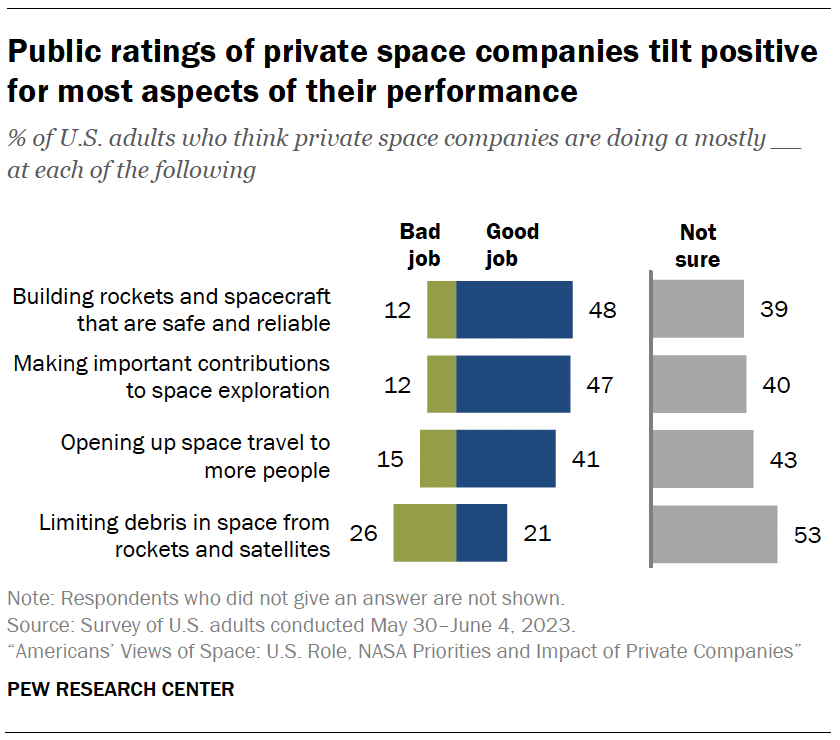
By contrast, evaluations of the job private space companies are doing limiting space debris are much less positive.
Slightly more Americans think private space companies are doing a mostly bad job than a mostly good job limiting debris from rockets and satellites in space (26% vs. 21%). Roughly half of U.S. adults (53%) say they are not sure how private space companies are doing on this issue.
Democrats are especially critical of private space companies’ efforts to limit debris in space. Among Democrats, 34% say they are doing a mostly bad job at this, while just 16% say they are doing a mostly good job (49% say they aren’t sure). Among Republicans, more say private companies are doing a mostly good than mostly bad job limiting debris in space (27% to 18%, with 54% not sure).
For the three other aspects of private space company performance included in the survey, partisan groups are largely in agreement, though Republicans offer positive assessments by a wider margin than do Democrats. For more, refer to the Appendix.
Americans who are most familiar with private space companies offer largely positive evaluations
About two-in-ten Americans say they have heard or read a lot about private space companies developing space exploration capabilities, while 54% say they have heard a little about this and 24% say they have heard nothing at all. The share of Americans who have heard at least a little about private space companies’ efforts is up 13 percentage points since 2018. Men and those with higher levels of education are particularly likely to say they are familiar with private space companies.
Americans most familiar with private companies’ space efforts are especially positive in their evaluations of the job they are doing. Large majorities of those who have heard a lot about private space companies say they are doing a mostly good job building reliable spacecraft and rockets, as well as making important contributions to space exploration.
For example, among those who say they have heard a lot about private space companies, 72% say they are doing a mostly good job making important contributions to space exploration, while 12% say they are doing a mostly bad job and 16% are not sure.
Those with less familiarity are far less likely to give these private companies a positive rating in building reliable spacecraft and rockets and making important contributions to space. Still, small shares in this group give private companies negative ratings; sizable shares say they are not sure.
For more, refer to the Appendix.
Americans’ interest and participation in space-related activities
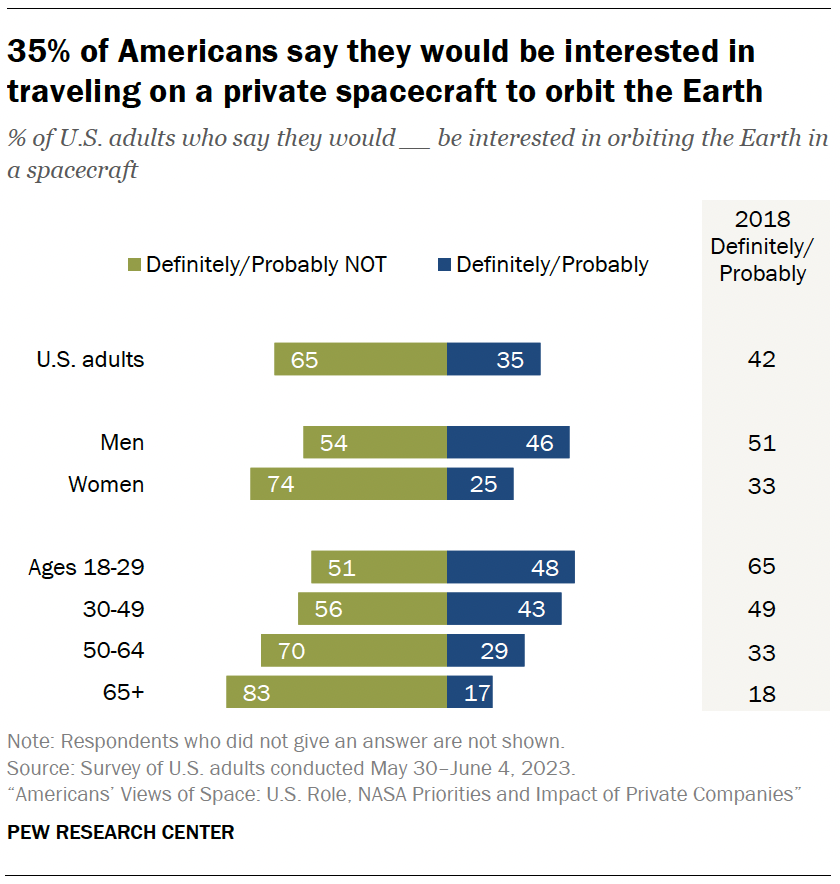
When it comes to interest in space tourism, more Americans say they would not be interested in orbiting Earth in a spacecraft (65%) than say they would be interested in this (35%). Interest is down 7 percentage points from 2018, when 42% said they would definitely or probably be interested in this.
The space tourism industry is expected to expand significantly in coming decades, with multiple companies engaged in commercial spaceflight operations.
Younger adults are more interested in orbiting Earth than older ones. About half of those ages 18 to 29 say they would definitely or probably be interested in orbiting the Earth in a private spacecraft. Interest is lower among older adults. For instance, just 17% of those ages 65 and older say they would want to do this. Still, interest among the youngest adults in orbiting the Earth is significantly lower than in 2018, when 65% expressed interest.
In addition to age differences, men (46%) are more likely than women (25%) to say they are interested in traveling on a private spacecraft to orbit the Earth.
Americans’ engagement with space-related activities
The survey measures some of the ways Americans can engage with space-related activities and events in their own lives. Most Americans say they’ve done at least one space-related activity before, like visiting a planetarium or watching a space launch, though the shares who have done so more recently (within the last year) are more modest.
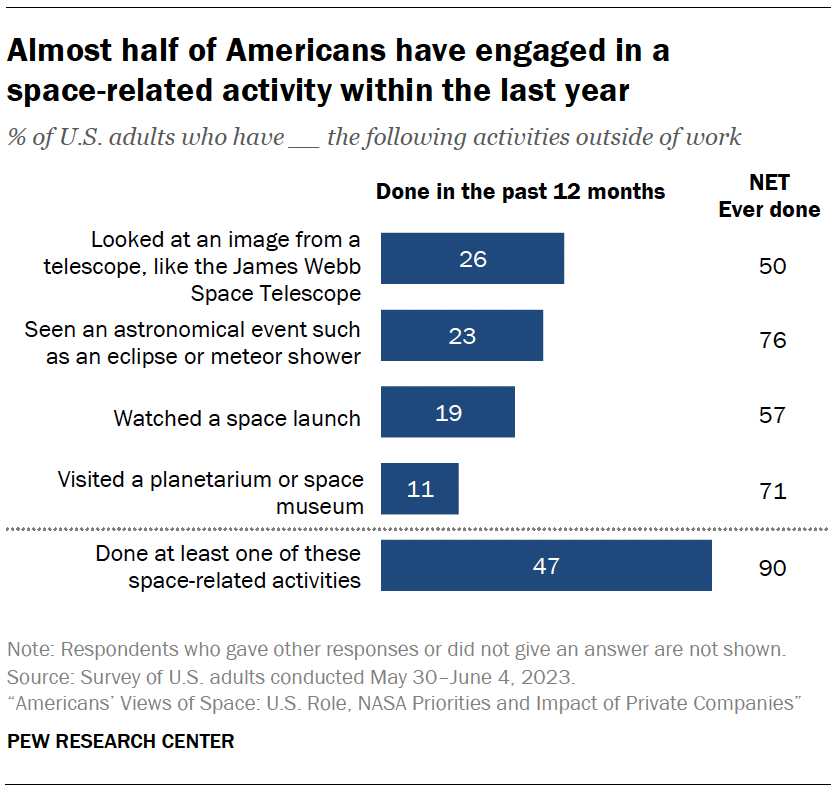
Overall, 26% of U.S. adults say they have looked at an image from a space telescope, such as the James Webb Space Telescope, in the past year. The James Webb Space Telescope was launched at the end of 2021 and is the largest telescope in space.
A similar share (23%) say they’ve seen an astronomical event such as an eclipse or meteor shower in the last year, and 19% say they’ve watched a space launch within the last 12 months. A relatively smaller share (11%) say they’ve visited a planetarium or space museum recently.
Taken together, nearly half of Americans (47%) say they’ve done at least one of these space-related activities in the last year.
Men are more likely than women to say they’ve participated in at least one space-related activity within the last year (55% vs. 38%). The gender gap is seen across most items included in the survey; the largest gap across these items is in the shares who say they’ve looked at an image from a space telescope in the last year (36% of men vs. 17% of women).
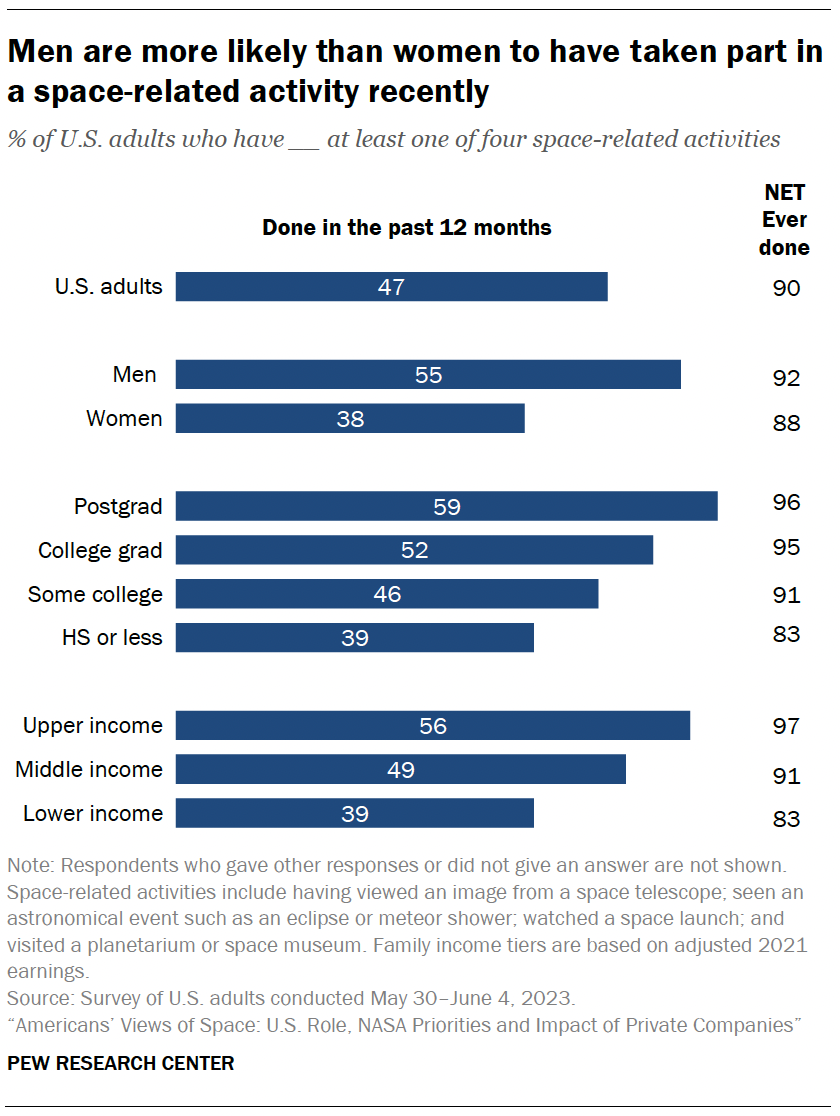
There are also differences in engagement with space activities by education and income levels.
Those with higher levels of education are more likely to have participated in a space-related activity recently than those with lower levels of education. For instance, 59% of postgraduates have done at least one of four space-related activities within the last year, compared with 39% of those with a high school diploma or less education.
There’s a similar pattern by income, with higher earners more likely to engage with space activities than those earning less.


